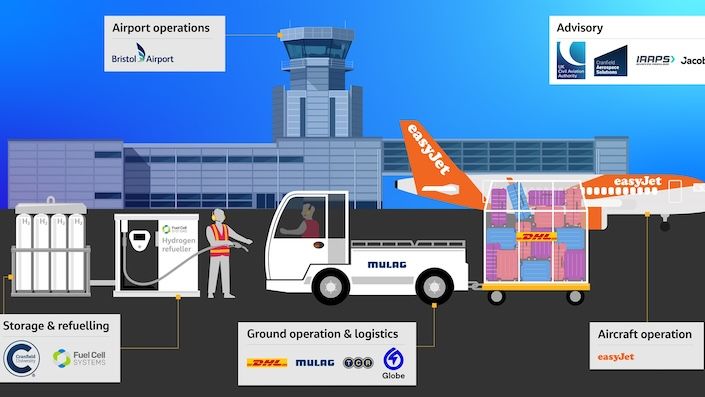Where travel agents earn, learn and save!
News / Ground-breaking airport hydrogen trial next critical step on journey to achieving zero emission aviation
Project Acorn is the first airside hydrogen refuelling trial ever to take place at a major UK airport

A ground-breaking airside hydrogen refuelling trial, led by easyJet and supported by several cross-industry partners, has been successfully completed at Bristol Airport – the first airport trial of its kind at a major UK airport.
Hydrogen was used to refuel and power ground support equipment (GSE) – specifically, baggage tractors – servicing easyJet passenger aircraft. Conducted as part of the airline’s daily operations, the trial demonstrates that the gas can be safely and reliably used to refuel ground equipment in the busy, live airport environment.
The trial, dubbed Project Acorn, was in development for over a year and involved many other leading organisations from across aviation, engineering, logistics and academia. These include Cranfield Aerospace Solutions, Cranfield University, Connected Places Catapult (CPC), DHL Supply Chain, Fuel Cell Systems, the IAAPS research institute, Jacobs, Mulag and TCR.
The group intends to use the outputs of the trial to help develop industry best practice standards, provide guidance to airports, airlines, local authorities and regulators on required infrastructure changes, and support the development of a regulatory framework for hydrogen’s use on an airfield – standards which, due to hydrogen’s nascency in aviation, do not currently exist.
The data and insights gathered will also feed into research that groups like Hydrogen in Aviation (HIA)* are conducting to ensure UK infrastructure, regulatory and policy changes keep pace with the technological developments in carbon-emission free flying. It also supports the work and ambitions of other bodies such as Hydrogen South West (HSW) and the Hydrogen Innovation Initiative (HII), the latter having also co-funded the project.
Project Acorn - the seed to more rapid hydrogen growth in the UK:
There is a compressed time window for the UK’s aviation industry to develop the ground infrastructure, safety standards (including how to use, control and transport hydrogen) and operational procedures needed to make the sector’s operations hydrogen-ready.
Project Acorn is designed to be a first step on this journey, with limited trials of GSE equipment accomplishing a key objective of receiving clearance for airside refuelling from the Civil Aviation Authority (CAA) – the regulator playing an active role in the trial as an independent reviewer of the safety case.
The safety assessments and emergency planning with local authorities that serve Bristol Airport will also provide invaluable learnings for future developments and serve as a blueprint for other local authorities – providing them with the necessary skills and resources to assist airports in making the transition to hydrogen.
A shorter-term objective for this project is to lead to the long-term or permanent deployment of hydrogen GSE at Bristol Airport and readying the airport for trials and then commercial operations of hydrogen-fuelled aircraft.
Developing the safety case and regulatory framework to accelerate hydrogen in aviation:
Another objective of the trial is to develop the safety and regulatory framework needed to accelerate hydrogen in aviation.
While hydrogen is a potential zero carbon emission fuel source for aviation and important developments have already been made across the industry**, there remains significant regulatory, safety and certification challenges. More research and testing is therefore required to inform hydrogen infrastructure policy and safe handling in airport and airline operations to support future hydrogen adoption.
Project Acorn’s operational trial of gaseous hydrogen-fuelled GSE in an airport environment represents one such opportunity and, as the first airside hydrogen refuelling trial to take place at a major UK airport, it is a significant milestone and an important stepping stone in future developments for hydrogen’s use in aviation.
The ultimate aim of this research is to support the wider decarbonisation of aviation through more rapid uptake of hydrogen.
A step-by-step guide to the key stages of the trial:
- Safety & Evaluation: Landside operational trials and training were conducted in a safe and controlled environment at Cranfield University in the weeks prior to the test at Bristol airport.
- Storing and distributing the hydrogen: Tanks containing hydrogen (H2) and a hyQube hydrogen refueller, designed and provided by Fuel Cell Systems Ltd, were transported to the Project Acorn trial site at Bristol Airport. In terms of how the process works:
- The hyQube acts as the ‘fuel pump’ to pump hydrogen from the H2 cylinders into the empty tanks of the baggage tractor – the end use for the hydrogen
- The hyQube dispenses hydrogen through an attached nozzle exactly like refuelling a car at the petrol station. Although unlike refuelling a car, the nozzle doesn’t have to be held during fuelling as a complete seal is formed when the refueller is connected to the baggage tracto
- The hyQube dispenses the hydrogen gas from the H2 cylinders into the tanks onboard the Mulag baggage tractor with just the press of a button
- Once the tanks reach the full pressure of 350bar – indicating the vehicle is fully fuelled – the hyQube automatically shuts off, the operator disconnects and the vehicle is ready to go!
- It takes approximately 3 minutes to fill up a full tank on the baggage tractor and this will keep it running for 2-3 hours before needing more fuel
- End use (powering the tractor): The GH2 baggage tractor (manufactured and factory tested by Mulag and fitted with a Globe FC proton-exchange membrane fuel cell) was refuelled by trained DHL personnel via the mobile refueller at Bristol Airport. DHL’s personnel operated the GH2 baggae tractorto service easyJet aircraft turnarounds at a remote stand at Bristol Airport, which towed passenger luggage from easyJet passenger aircraft to and from the plane and airport as part of a normal operation.
The many benefits of hydrogen in aviation:
Many leading experts believe hydrogen powered aviation will not only be pivotal in delivering net zero, but it will bring many economic benefits too.
The Department for Transport’s Jet Zero Strategy*** estimates that rapid investment in hydrogen aviation could provide upwards of 60,000 new jobs across the UK, with Hydrogen UK projecting that hydrogen could contribute £18bn GVA and help meet up to 50% of the UK’s energy requirements by 2050.
Green hydrogen, produced from renewables, is a particularly exciting alternative aircraft fuel as, unlike other alternatives, it produces no carbon emissions. If fully realised, it will aid significantly with the industry’s decarbonisation goals, while helping preserve an industry that provides significant value to our economy – UK aviation employs 230,000 people and contributes more than £22bn directly to GDP per year, plus £34bn from exporting aerospace components.
The Jet Zero Council has projected in the strategy that rapid investment in hydrogen aviation could see the UK securing up to 19% global aerospace industry and share of a benefit valued at £178bn per annum in 2050, which means this could generate an additional £34bn per annum for the UK.
Investing in hydrogen will also help to preserve the social benefits of flying, continuing to connect people to business, loved ones and new destinations.
*Hydrogen in Aviation (HIA) is formed of easyJet, Rolls-Royce, Airbus, Ørsted, GKN Aerospace and Bristol Airport.
**Airbus announced its ZEROe project and the ambition to bring the world’s first hydrogen-powered aircraft to market by 2035, and Rolls-Royce and easyJet’s partnership to develop hydrogen-powered engine technology continues to go from strength to strength.
*** Department for Transport’s Jet Zero Strategy











